#Alexander Woolcott
Text
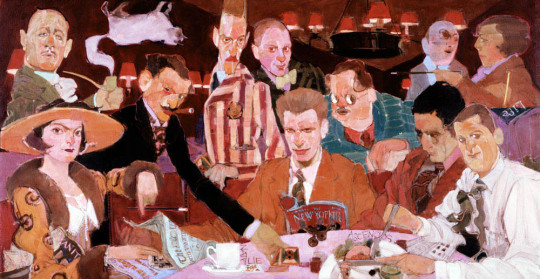
Natalie Ascencios's 2002 painting, A Vicious Circle, of the Algonquin Round Table. It hangs in the hotel today.
From left to right, standing: Robert Benchley, Franklin Pierce Adams, Robert Sherwood, Harpo Marx, Alexander Woolcott, Marc Connelly, Edna Ferber. Seated: Dorothy Parker, Harold Ross, George S. Kaufman, Heywood Broun. The Algonquin Cat is standing upside down at top left.
Photo: Natalie Ascencios via ascencios.com
#vintage New York#1920s#Natalie Ascencios#Algonquin Round Table#A Vicious Circle#cat#painting#Franklin Pierce Adams#Harpo Marx#Robert Benchley#Robert Sherwood#Dorothy Parker#Edna Ferber#Heywood Broun#Alexander Woolcott#Harold Ross#George S. Kaufman#Marc Connelly
54 notes
·
View notes
Text


“Dean loved having people around—to a point. Then he wanted his privacy, his TV, his sleep, and he had some of the most blunt ways of getting rid of his guests. If it weren’t for his charm, he wouldn’t have a friend left! I still remember how horrified I was the first time he notified his guests, “I’m tired, folks. Why don’t you go home?” Another evening he loudly recalled Alexander Woolcott’s remark, “Guests are like fish. After a while they stink.” He went so far as to go to his room, change into his pajamas and come back to lie down in the middle of the living room floor.” — Jeanne Martin
94 notes
·
View notes
Text
BUDDIES
1920
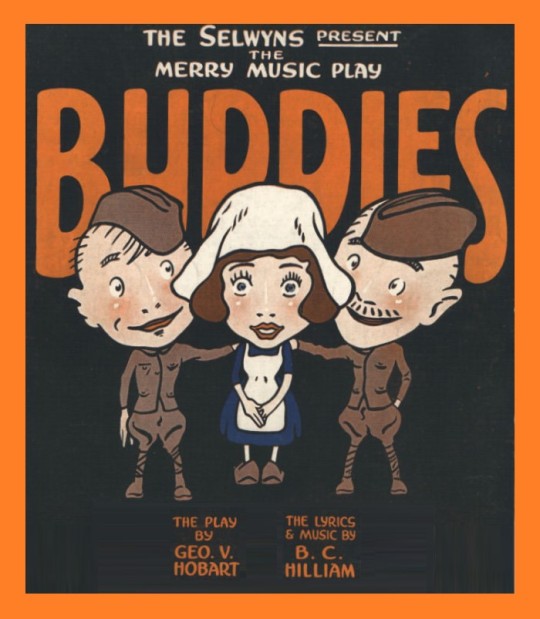
Buddies is a musical by George V. Hobart with music and lyrics by B.C. Hilliam, and musical contributions by Melville Gideon and Cole Porter. It was originally produced by Arch and Edgar Selwyn.
The song “I Never Realized” was partly credited to Cole Porter. The song turned up again in the London musical The Eclipse in November 1919.
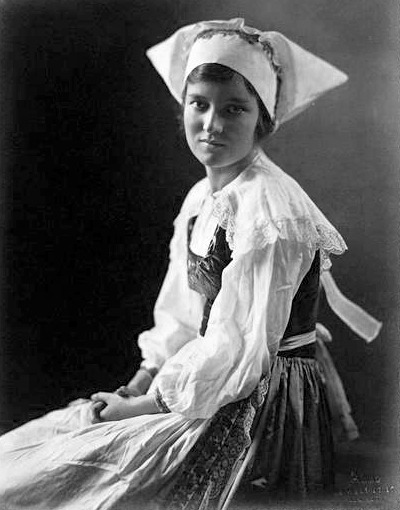
The original cast included Peggy Wood as Julie, Donald Brian as Sonny, and Roland Young as Babe.
The musical takes place in the home of Madame Benoit, somewhere in Brittany, France.
The story unfolds a few days after the Armistice. A group of soldiers are billeted with Madame Benoit and her daughter Julie. One doughboy, Babe, falls in love with Julie but is too shy to court her. Fond of Babe and hoping to make him jealous enough to speak up, Julie flirts with his buddy, Sonny. Her ruse works! But trouble arrives in the form of an Alsatian restauranteur who accuses Madame Benoit’s deceased war hero son of robbing him in America. He insists she repay him the money. Julie offers to marry him to save the honor of her late brother. The entanglements are cleverly resolved at the last moment so that all may end happily.
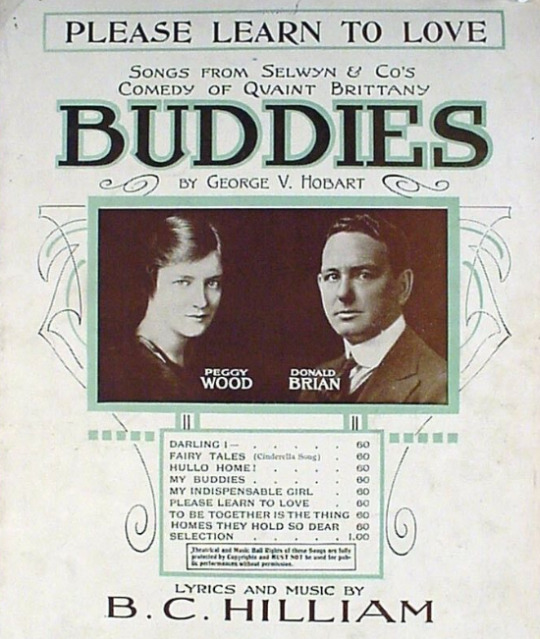
“Good-bye, trenches; Hello, Frenchies!” ~ BUDDIES

Buddies had its world premiere at Park Square Theatre in Boston starting on August 12, 1919, where the role of Babe was played by Wallace Eddinger.
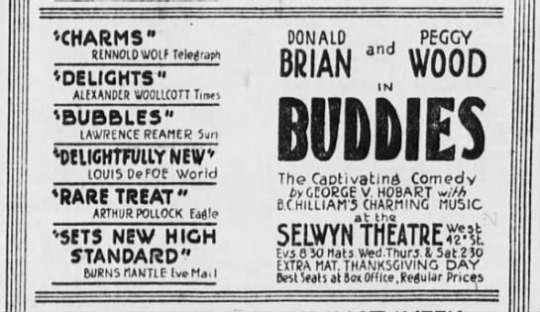
Buddies opened on Broadway at the Selwyn Theatre (now the American Airlines Theatre) on October 27, 1919.
ABOUT THE VENUE: Producers Edgar and Archie Selwyn owned several theaters in the United States including three in New York. The Selwyn opened in 1918. It included such novel features as separate smoking rooms for men and women as well as a shower and telephone in each dressing room. It became a movie theater in the 1930s and eventually fell into disrepair. In 1997 The Roundabout Theatre Company, renovated the theater including the ceiling dome and the murals. The theater, renamed for its principal sponsor, reopened in 2000.

~ ALEXANDER WOOLCOTT in THE NEW YORK TIMES
“The jokes about Brooklyn are abundant, but if Miss Wood, who comes from Brooklyn herself, can stand them, probably the public can.” ~ NEW YORK SUN
The “Merry Music Play” ran for 259 performances.
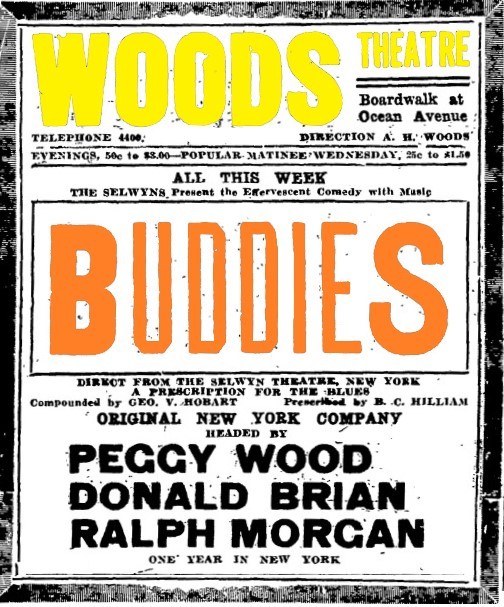
After its Broadway run, the play opened in Atlantic City at Woods Theatre on the Boardwalk on July 26, 1920. Ralph Morgan replaced Roland Young in the role of Babe. Although Virginia O’Brien had replaced Peggy Wood on Broadway, she rejoined the company for this tour.

Reviewing the show in the Atlantic City Press, the writer started by noting the status of Atlantic City as a try-out town (aka “dog town”). That reputation would continue until 1930, when all but one theatre was still presenting regular theatrical productions, and very few were try-outs.
Also in New Jersey, Buddies played the Savoy Theatre in Asbury Park on September 9th.
#Buddies#Atlantic City#Broadway Musical#Selwyns#Peggy Wood#Woods Theatre#Boardwalk#New Jersey#B.C. Hilliam#George Hobart#1919#World War One#Cole Porter#American Airlines Theatre#Broadway
2 notes
·
View notes
Text

Alredered Remembers Alexander Woolcott , American short-story writer, critic for The New Yorker magazine, member of the famed Algonquin Round Table, on his birthday.
"There is no such thing in anyone's life as an unimportant day."
-Alexander Woollcott
0 notes
Photo
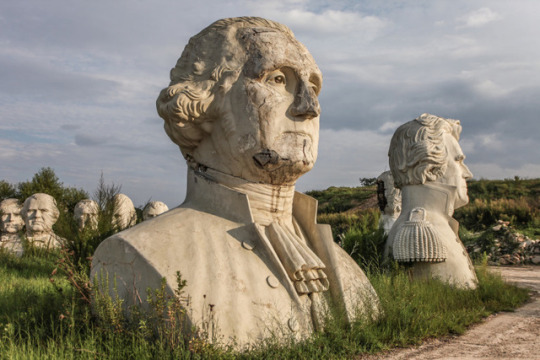
Arresting photos of the "Abandoned Southeast"
(Plus- Alexander Woolcott)
“Reality seems valueless by comparison with the dreams of fevered imaginations; reality is therefore abandoned”*…
Forget to remember at: https://bit.ly/2T33O41
#photography#abandoned southeast#Leland Kent#history#amusement parks#tourist attractions#abandoned buildings#alexander woolcott#the man who came to dinner#humor#Algonquin Roundtable#Laura
1 note
·
View note
Photo
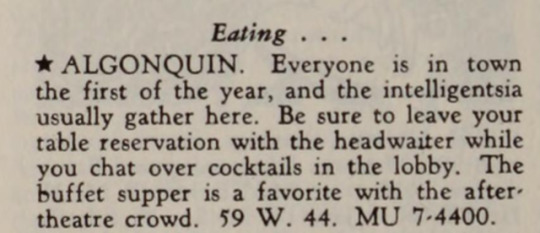
the Algonquin
#Dorothy Parker#Alexander Woolcott#Clifton Fadiman#Robert Benchley#Harpo Marx#George S. Kaufman#Herman Mankiewicz
7 notes
·
View notes
Link
“Lillian Gish was there at the birth of an art form,” said the evening’s host, Douglas Fairbanks Jr., 75. “I am kind of an emissary, a link, if you like, from those pioneers who were with her at the beginning, my father, my stepmother, Mary Pickford; Charlie Chaplin; and all the others whom Lillian refers to as those charming ghosts.”
Through it all, Gish was very much the center of what seemed, at times, like a family get-together, her face radiating what critic Alexander Woolcott once called “a strange mystic light not made by any electrician.”
1 note
·
View note
Photo

George Gershwin and Alexander Woolcott for Chase & Sanborn coffee, illustrated by Miguel Covarrubias
The New Yorker, 1930
2 notes
·
View notes
Text
A great quote from Alexander Woolcott about Dorothy Parker, 1920′s: “She is an odd blend of Little Nell and Lady Macbeth. It is not so much the familiar hand of steel in velvet glove as a lacy sleeve with a bottle of vitriol concealed in its folds.”
12 notes
·
View notes
Text
THE ENCHANTED COTTAGE
March 31, 1923

The Enchanted Cottage is a three-act fantasy by Sir Arthur Wing Pinhero, produced by William A. Brady, who co-directed with Jessie Bonstelle. It opened on March 31, 1923 at the Ritz Theatre and ran for 65 performances.
The play is set in rural England.
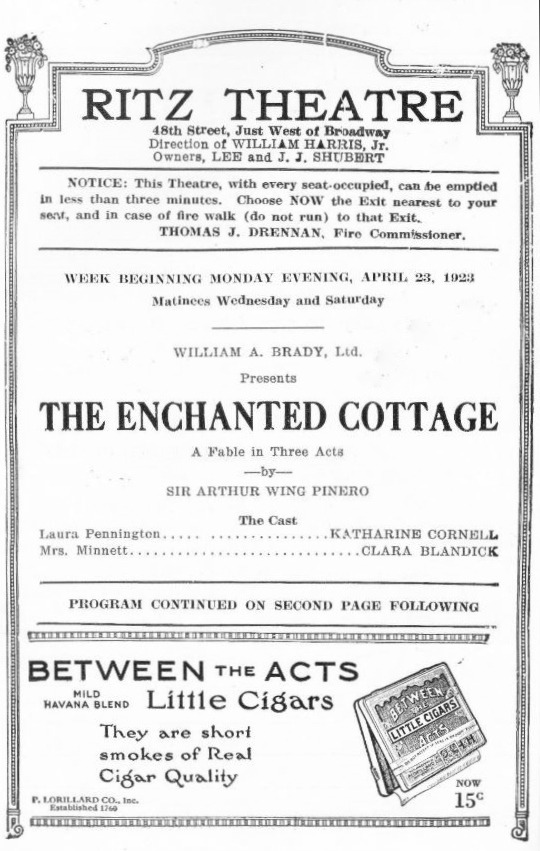
Synopsis ~ A homely maid and a scarred ex-GI meet at the cottage where she works and where he was to spend his honeymoon prior to his accident. The two develop a bond and agree to marry, more out of loneliness than love. The romantic spirit of the cottage, however, overtakes them. They soon begin to look beautiful to each other, but no one else.
The play was first produced in London’s West End at the Duke of York’s Theatre on March 1, 1922. The play was published by Heinemann in 1922.
In April 1925, The Enchanted Cottage was the opening play for the Omaha Community Playhouse, starring Dodie Brando, mother of Marlon Brando.
A musical adaptation emerged early in 2000. The book is by Thomas Edward West, lyrics by Alison Hubbard, and music by Kim Oler. The musical made its debut in 2002 at the National Alliance for Musical Theatre (NAMT) Festival of New Musicals in New York and has had several productions since.
In December 2018, a staged reading of the play was presented off-Broadway by the Gingold Theatrical Group’s Shaw Project.
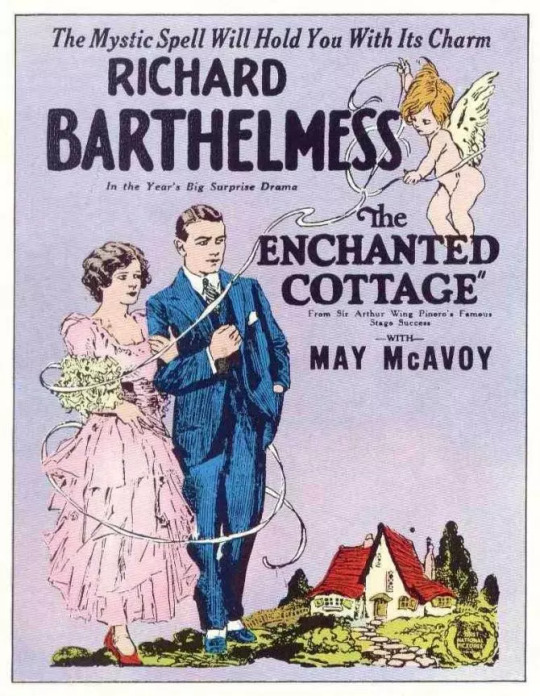
A silent film adaptation was released in 1924 starring Richard Barthelmess and May McAvoy.
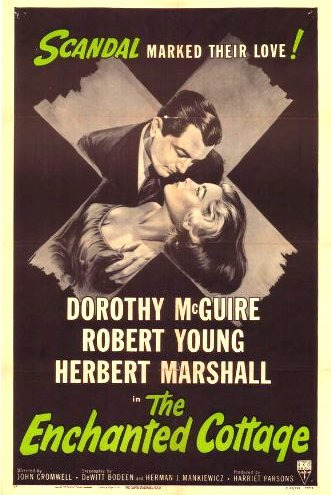
A film adaptation was released in 1945 starring Dorothy McGuire and Robert Young. In 1973 it was announced that a remake would be made with the two stars in supporting roles. The idea fell through after McGuire said that the film belonged to another period and that she did not want to go backward.
In 1949 a radio version was broadcast starring Ray Milland, Margaret Phillips, and John Carradine.
A television adaptation by Walter Ferris was aired in December 1952. A second TV version was made in 1955 as part of “Lux Video Theatre.”
In 2009, the New York Daily News reported the rumor that Cher would direct and star in a film version of The Enchanted Cottage.

A widely panned independent film adaptation was released in 2016 with the timeline advanced to the present day.
AUTHOR

Arthur Wing Pinero (1855-1934) was born in England and became an actor at age 19, performing with Sir Henry Irving’s company in London. Pinero wrote his first play in 1877. Seven years later, having written 15 more, he abandoned acting and became a full-time playwright. The Second Mrs Tanqueray (1893), dealing with a woman with a scandalous past, was regarded as shocking, but ran well and made a large profit. His other successes included Trelawney of the "Wells" (1898), a romantic comedy celebrating the theatre. Pinero was knighted in 1909, only the second dramatist to receive the honor (W.S. Gilbert having been knighted two years earlier). One of Pinero’s friends and colleagues was George Bernard Shaw.

CAST
Katharine Cornell
(1893-1974) as Laura Pennington. Cornell was one of the pre-eminant stage actors of the early 20th century. This was her fourth of 40 Broadway plays, most notably
The Barretts of Wimpole Street
(1931), which she revived in 1935 and 1945. She was married to director Guthrie McClintic, making a Broadway power couple.
Noel Tearle (1892-1970) as Oliver Bashforth. This is Tearle’s 7th of nine Broadway plays from 1917 to 1930. His first Broadway show was Disreali in 1917. He also did the film version in 1921. This was one of only four films he is credited with.
Clara Blandick (1880-1962) as Mrs. Minnett / First Witch. Blandick is probably best known as Auntie Em in the 1939 MGM film The Wizard of Oz. Before moving to Hollywood in 1929 to devote the rest of her career to film work, she did 20 Broadway plays starting in 1901.
VENUE

The Ritz Theatre (219 West 48th Street; 945 seats) was built in just 66 days, a record in 1921. It was leased by the Federal Theatre Project in 1937. It was used as a radio and TV station from 1943 to 1965, with Alexander Woolcott broadcasting his Broadway commentaries from the stage. After being dark from 1965 to 1969, it was bought and renovated in 1971. Ten years later, Jujamcyn bought it, renovating it further in 1989. In 1990, it was renamed for critic-playwright Walter Kerr. The venue’s longest run was Proof (2000) which ran 917 performances.
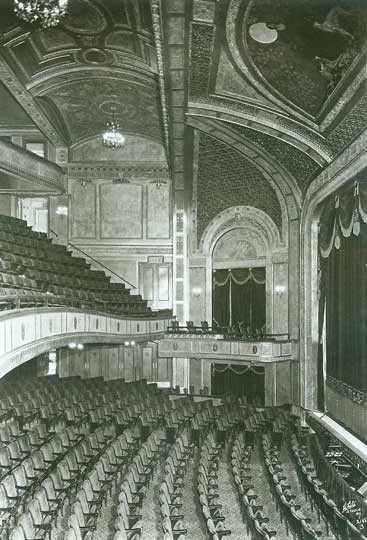
#The Enchanted Cottage#Arthur Wing Pinero#Ritz Theatre#1923#Broadway#Stage#Theatre#Play#Walter Kerr Theatre#Katharine Cornell#Clara Blandick#Noel Tearle#World War One
9 notes
·
View notes
Photo

George Gershwin and Alexander Woolcott for Chase & Sanborn coffee, illustrated by Miguel Covarrubias. Ad from the March 15, 1930 edition of The New Yorker. Click to enlarge.
Source
12 notes
·
View notes
Text
"Alexander Woolcott once said that all the things he really liked were immoral, illegal, or fattening." -- Verrier Elwin
0 notes
Text
Tench Coxe and Hamilton
I'm not going to write about Tench Coxe as a friend to Hamilton, for reasons that should be obvious below, but there's too much snappy correspondence in AH's final months in office as Treasury Secretary for me not to include him somehow.
Born in 1755 in Philadelphia, Coxe was a British sympathizer during the war and then became a successful Philadelphia businessman. Coxe was a PA delegate to the final Continental Congress.
I’m not sure when AH first came to know of Coxe, but he’s mentioned here in a letter from G. Morris in 1784, where Morris states that AH already knows him. In May 1785, Coxe attempts to hire AH as his attorney for a land dispute, but AH was already opposing counsel.
In May 1790, Coxe replaces William Duer as Hamilton's assistant Secretary of the Treasury. Coxe was a leader in the British industrial espionage efforts; indeed, he may have gotten the job with AH in part because of the success he was having recruiting persons with detailed knowledge of English textile machinery to the U.S. When AH appoints Coxe as his assistant, he states:
The appointment of his assistant is, by the act establishing the treasury department, vested in the secretary himself. The conviction I have of your usefulness in that station, and my personal regard for you, have determined me to avail myself of the offer of service which the last mentioned letter contains.
Timothy Pickering also had wanted the job, and AH assures him that he will keep him in mind for other appointments in public life, but:
Reasons of a peculiar nature, however, have determined my choice towards Mr. Tench Coxe, who to great industry and very good talents adds an extensive theoretical and practical knowlege of Trade.
Coxe applies himself to the new position, including drafting reports to Congress (x, x, x as examples) for AH. His house in Philadelphia becomes the Treasury Department's office (rented to the gov't for $660 per year). He is critical to the Society for Establishing Useful Manufactures venture - his early thoughts and proposals, pre-dating his appointment as AH’s assistant, may have been the nucleus of this idea.
Coxe is the co-author of the Report on Manufactures, sometimes called Hamilton’s greatest work, presented to Congress on 5Dec1791. From the Introductory note to the report, written by editors of the Papers of Alexander Hamilton:
Hamilton’s first draft of this Report is considerably longer than Coxe’s, but it is equally significant that Hamilton incorporated a major part of Coxe’s draft in his own first draft.
After denying Coxe appointment to the vacated position of Comptroller of the Treasury (a position that went to Oliver Wolcott, Jr, who AH supported, specifically telling GW that Wolcott was the better choice), in June 1792, Washington appoints Coxe as Commissioner of the Revenue, a new position.
Fast-forward three years. It’s not totally clear when the relationship between Coxe and AH began to break down. From notes that Coxe would add to letters from AH, he seemed frustrated that AH would ask him for details he had already supplied. AH may have become sensitive to Coxe’s friendship with James Madison; he may also have suspected that Coxe was passing notes to Jefferson on AH’s plans (this is somewhat controversial, as some historians have interpreted these Coxe letters to Jefferson as collusion between AH and Coxe where AH is trying to manipulate GW by not having the topics come directly from himself). Maybe all the correspondence between them about lighthouses, timber, whaling oil, and salt finely wore them down, as it would in any relationship. Maybe Coxe got tired of lending AH money [5July1794]:
Mr. Coxe will be very much obliged to Mr. Hamilton for the sum of 80 Drs. wch. he had the pleasure to lend him, if it be convenient to replace it. An unexpected call to pay off a Note for a gentleman to whom Mr. Coxe had lent his Name is the occasion of his troubling Mr. H.
Or more likely, Coxe was frustrated because he hoped to succeed Hamilton as Treasury Secretary following the latter’s resignation in 1795. He engages in back-and-forth accusations with Washington about AH's conduct the prior year, implicating Oliver Wolcott, Jr, as exceeding his role as Comptroller. Washington takes AH's side and appoints Wolcott, AH's choice and close friend, as the next Secretary of the Treasury. Coxe starts to get cozy with the Democratic-Republicans, and Adams dismisses him from the position of Commissioner of the Revenue in 1797. See here for a biography of Coxe.
Back to 1795. As Jacob E. Cooke writes (Alexander Hamilton, 1982), "Coxe...attempted to make Hamilton's final weeks in office as trying as possible."
Let's look at how this plays out. First, Coxe tries to defend himself against an accusation of moving too slowly and not doing the duties delegated to him in AH's absence, to which AH responds. AH to Coxe 29Dec1794
I think my conduct must have proved to you that it has not been my intention to impute to you blame for any delays or deficiencies, which may have existed or which may exist in the execution of those portions of the business of the Department which are confided to you. ...
It is true also that the affair of the Insurrection occupied much of the time and attention both of the President and myself; but I am not conscious that I ever declined going into the arrangement of the compensations on this account and I feel persuaded that if you had matured and prepared the materials, I should have made time and opportunity to cooperate with you in their application. ...
In your letter of the 28th you again allude, as among the causes of some derangement or extreme present pressure of your business, to my absences from the seat of government in August October and November and to my occupation in the interval of those calls in attention to the Western Insurrection.
My absence in August (You must mean July) lasted about a fortnight. As to my absences In October and November you were informed that Mr. Woolcott was to act in my stead during those absences.
I make these observations with reluctance & merely to avoid the appearance of admitting by silence what may be hereafter liable to misconstruction... I assure you sincerely that I do not mean to imply the least blame upon you or to intimate that there has been any exceptionable deficiency on your part. On the point of leaving the department, as I am, it is more than ordinarily my wish to avoid any thing like official collision.
So Coxe may have thought AH was unfairly blaming him, AH helpfully points out that he did screw up, but it’s not a big deal, and hey, let’s be friends. But then AH again points out Coxe's delays, and I love Coxe's footnote. AH to Coxe, 22Jan1795
These papers are not perfected - there are blanks not filled. The sums are not added up & the former expence is not brought forward with the additional latitude so as to shew a general result.
Mr. Hamilton requests Mr. Coxe to have them immediately completed. He will call at Mr Coxe’s office at two to confer.
At the foot of this letter Coxe wrote: Thursday Jany 22, 1795. He had the papers two Weeks.
Coxe decides to go to the President to complain that AH's complaints about him the prior year would have required him to act in an illegal manner by employing Wolcott, the Comptroller, to exercise the duties of the Treasury Secretary. Coxe to GW, 31Jan1795:
I trust you will believe my solemn assurance of you, that a very painful sense of duty has impelled me to the Communication, which I have now the honor to make to you. As it will be perceived, that it is one of those cases in which an obedience to that sense may produce inconveniencies, I address you, Sir, as much in confidence as you may conceive the nature of the case to admit.
...It also appears, that the Legislature judged, that even the President of the United States could not commit the powers and duties of the Secretary of the Treasury to any other person without the formal investment of him with Authority so to do.
I sincerely wish my Ideas may be inaccurate, but entertaining them as I really do, it appears to be my duty to submit them to you.
The very next day, GW to AH, 1Feb 1795
Dear Sir
I received the enclosed letter with the document therein, last night.
For reasons which will appear obvious, I make you acquainted with the contents of them, being
Yours
I love the weariness and brevity of this, as though GW gets letters about AH's bad behavior ALL THE TIME, and he's just going to wait for the lengthy and indignant reply, which he of course gets the very next day. AH proceeds to lecture GW on the legal matters, does his favorite little trick of telling GW “we discussed this, you just don’t remember,” and then maneuvers for Wolcott. Oh, the snarkiness. AH to GW, 2Feb1795
I forbear to make any comments on that violent sense of duty which at this late and critical hour has compelled the virtuous mind of Mr. Coxe to make to you the communication contained in his letter of yesterday.
I shall proceed to submit to The President with candour and truth my view of the case. Towards this it will be useful to cite the expressions of the Act referred to. [Long explanations of Section 8 of An Act making alterations in the Treasury and War Departments and Section 3 of An Act to establish the Treasury Department]
...In conversation with you concerning my going upon the expedition, I mentioned that the business of the Department could without injury be conducted in my absence by The Comptroller. I do not remember that you made any direct reply; but I inferred your concurrence either from what you said or from your having made no observation by way of objection.
...I suffered the hurry of the period incumbered as I was by the weight both of the Treasury & War Departments, under circumstances that required great exertions in both, to press out of sight a measure which motives of caution had recommended.
...whatever cause of blame may have ensued falls upon me exclusively. It was natural for Mr. Woolcott to presume me to be in order. If he had deemed your formal sanction necessary it was natural for him to suppose that I had obtained it.
I remember however that some points in the report of the Committee, which Mr. Coxe did not like, were introduced without my concurrence, and that I told him so at the time; that his intrigues which have been incessant, in an incessant struggle for preeminence over Mr. Wolcott, had marshalled some personal friends of his with the usual opposers of the department to embarrass the progress of the Bill ...
But I have always viewed Mr. Coxe’s pretensions to make the opinions of his friends the standard for the execution of the law as neither modest nor correct.
In fine, I should have thought what Mr. Coxe would have deemed most consistent with the principles of the Department very wrong. I considered him as having already more business confided to him than his talents for execution were equal to a large part of which has since been with drawn from him at his own pressing request. I considered him as an inferior officer in the department to Mr. Woolcott and after the disposition he had shewn I should have regarded it as treating Mr. Wollcott ill to have invested him even with a temporary superiority. In the last place I had much greater confidence in the proper and efficient execution of the business by Mr. Wolcott than by him.
In response to an in person discussion they seem to have had on the matter to work out a more effective organization, AH helpfully lectures GW on the workings of the Treasury Dept and takes the opportunity to attack Coxe some more. AH to GW 12Feb1795
I have maturely reflected on the subject of the within papers. I do not hesitate to give it as my opinion that if it were not for very peculiar personal circumstances the fittest arrangement upon the whole would be to consign the temporary execution of the Comptroller’s office to The Commissioner of the Revenue. But I could not advise this, because it could not fail for strong reasons to be unpleasant to Mr. Wolcott, & because there is real danger that Mr. Coxe would first perplex and embarrass and afterwards misrepresent and calumniate.
In the midst of all the back and forth about Coxe's accusations and AH taking the opportunity to criticize him harshly, AH and Coxe are still corresponding with each other about land that AH had asked Coxe to purchase for John B. Church. See a letter and footnote summarizing that activity here.
This matter keeps AH and Coxe in correspondence for another two years, AH still complaining about Coxe's tardiness. AH to Coxe, 23Aug1797.
I enclose you a letter from Mr Church. I must add to it my earnest request that you will exert yourself to complete the business which is the subject of it. The punctuality of his temper occasions to me no small embarrassment in reference to a delay which appears to him extraordinary. I shall receive much pleasure from the knowlege that the affair is closed.
We also get AH offering his succinct opinion of Coxe. AH to Wolcott, 5Aug1795.
That man is too cunning to be wise. I have been so much in the habit of seeing him mistaken that I hold his opinion cheap.
I'll let that stand as AH's final recorded opinion of a man who was very important to him for his pet projects and plans for the growth of industry in the early 1790s.
1 note
·
View note
Text
THE DAGGER
1925

The Dagger (formerly The Crystal Flame) is a three-act play by Marian Wightman. It was originally produced by L. Lawrence Weber, staged by William B. Friedlander, and starring Ralph Morgan as Pierre “the Dagger”.
The play takes place in Paris.
Pierre is an Apache who has been cheated out of his rightful place in society. When he goes into his uncle’s home under an assumed name, he is betrayed to the police. He suspects his sweetheart, Colette, and plans to kill her in the ‘Dance of Death’ but relents because he loves her.
Apaches was a Parisian Belle Époque violent criminal underworld subculture of early 20th-century hooligans, night muggers, street gangs and other criminals.
‘The Dance of Death’ was not a literal dance, but a medieval allegorical representation in which a personified Death leads people to the grave.
PIERRE: "Do you think there is a God?"
COLETTE: "There must be a God.”
PIERRE: "Alas, then I must be his least favored child!"

The Dagger opened at Nixon’s Apollo Theatre in Atlantic City on June 29, 1925.
The play stopped at several more locations before Broadway: Asbury Park, New Haven, and Bridgeport.

The Dagger opened on Broadway at the Longacre Theatre on September 9, 1925.

“A heavily overacted, amateurishly written melodrama of the Paris Apache school of playwriting, congested with low dives, high motives, old hags, twin brothers, grisettes, coquettes, and Mistinguetts - in brief, you have ‘The Dagger’, which came to the Longacre this week.” ~ NEW YORK DAILY NEWS

“Ralph Morgan plays the role of Pierre, while Charles Richman is seen as his rich uncle. Two fine actors wasted on drivel!” ~ BROOKLYN TIMES UNION
"’The Dagger' had a lingering flavor of domestic manufacture. It was my own malignant guess that it been woven from some gentle lady's day-dreams up in Pittsfield.” ~ ALEXANDER WOOLCOTT
It ran for five performances. It was Wightman’s only play on Broadway.
#The Dagger#Nixon's Apollo Theatre#Longacre Theatre#1925#L. Lawrence Weber#William B. Friedlander#Marian WIghtman#Play#Broadway Play#melodramma#Apache#Paris#France#Dance of Death
1 note
·
View note
Photo
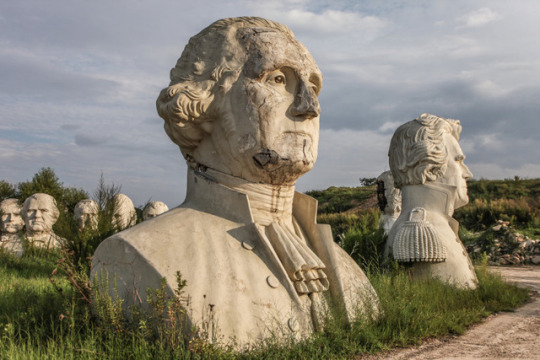
Arresting photos of the "Abandoned Southeast"
(Plus- Alexander Woolcott)
“Reality seems valueless by comparison with the dreams of fevered imaginations; reality is therefore abandoned”*…
Forget to remember at: https://bit.ly/2T33O41
0 notes
Quote
Çoğumuz, zamanımızın büyük bir bölümünü bir şeyler istemekle geçiririz; zamanı o şekilde harcamasak, istediklerimizi elde edebilirdik.
Alexander Woolcott
4 notes
·
View notes